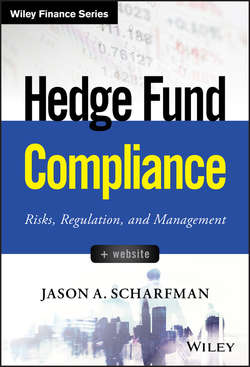Читать книгу Hedge Fund Compliance - Scharfman Jason А. - Страница 5
На сайте Литреса книга снята с продажи.
Preface
ОглавлениеCompliance is one of the fastest‐growing areas in the hedge fund industry. Contributing to this change is a seemingly steady drumbeat of new global regulatory activity. In the United States and in Asia, for example, regulators have steadily enhanced their hedge fund compliance enforcement and surveillance activities. In Europe, broad shifts in the laws, such as the Alternative Investment Fund Managers Directive (AIFMD) and the Markets in Financial Instruments Directive (MiFID), have directly influenced the way hedge funds carry out their investment activities.
Today, hedge fund compliance has evolved into more than simply a regulatory exercise. Hedge fund compliance programs are now required to regularly engage compliance risks across a wide variety of operational and investment areas, ranging from cybersecurity and conflict of interest management to trade allocation and increased oversight of the use of investment research. To meet these challenges, hedge funds and their investors and service providers must continually reevaluate the role of the compliance function to ensure that they not only meet these new regulatory requirements but also keep pace with industry best practices. This book is written to assist these groups in embracing this challenge.
Readers of this book will come from different levels of sophistication, ranging from those in an academic setting and new to hedge fund industry to experienced hedge fund compliance professionals working in the compliance field. To assist in highlighting important compliance terminology as you read through each of the chapters, you will find key terms italicized and in boldface. Regardless of your previous compliance experience, this book can also serve as a reference source on specific compliance topics. To facilitate this, the chapters of this book have been organized by key compliance topic area for ease of navigation.
Specifically, this book is structured to provide an understanding of the core concepts of hedge fund compliance across three sections. The first section, Chapters 1 through 4, focuses on topics relating to the structure and duties of a hedge fund's internal compliance function. It begins by providing an introduction to the compliance function and the role of regulators. The Chief Compliance Officer (CCO) role, as well as the responsibilities of other shared and dedicated compliance personnel, are then discussed. This section concludes with an analysis of the function of internal compliance mechanisms, such as fund committees.
The second section of the book, Chapters 5 through 8, focuses on specific topics in compliance as well as the role of third parties in the process. This section begins by addressing the emerging role of technology in compliance management. The use of technology in performing a wide variety of compliance activities, including trade surveillance, archiving, and monitoring employee communications, is also covered. Next, the role of third parties that assist in compliance management, including compliance consultants, is discussed. Examples of key compliance documentation, including the Compliance Manual and Code of Ethics, are then presented. Finally, the process by which prospective and existing investors conduct due diligence on hedge fund compliance functions is addressed with a focus on the analysis of compliance policies regarding employee personal account dealing and material non‐public information (MNPI).
The third and final section of the book, Chapters 9 through 12, applies critical compliance concepts directly to the real world. It begins by focusing on historical case studies and illustrative scenarios as well as common compliance pitfalls. Interviews with third‐party compliance service providers are presented to demonstrate the practical opportunities and challenges facing hedge funds in working with third parties to implement and manage their compliance programs. Finally, the book concludes with a discussion of emerging topics and trends in the compliance space.
Compliance has evolved from a rote exercise of strictly following regulatory rules to one of the most prominent, dynamic, and multidisciplinary areas of hedge fund management. A strong compliance program can improve the overall operating efficiency and level of communication throughout a hedge fund. Similarly, hedge fund investors benefit from the additional oversight and transparency that comprehensive compliance programs can provide. Regardless of your role in the hedge fund industry, as compliance continues to evolve, developing a fundamental understanding of core compliance concepts is now an essential requirement for success.
Jason Scharfman
December 2016
